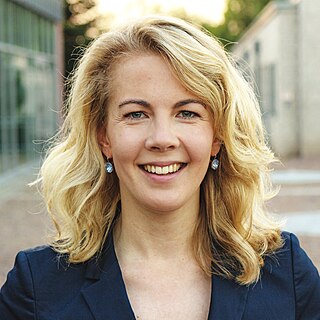Related Research Articles

Kurt Hans Biedenkopf was a German jurist, academic teacher and politician of the Christian-Democratic Union (CDU) party. He was rector of the Ruhr University Bochum.
Helmut Schelsky, was a German sociologist, the most influential in post-World War II Germany, well into the 1970s.
A works council is a shop-floor organization representing workers that functions as a local/firm-level complement to trade unions but is independent of these at least in some countries. Works councils exist with different names in a variety of related forms in a number of European countries, including Great Britain ; Germany and Austria (Betriebsrat); Luxembourg ; the Netherlands and Flanders in Belgium (ondernemingsraad); Italy ; France ; Wallonia in Belgium, Spain and Denmark.

Hermann Höcherl was a German politician of the Christian Social Union in Bavaria (CSU). He served as Federal Ministry of the Interior from 1961 to 1965 and as Federal Minister for Food, Agriculture and Forests from 1965 to 1969.

Republikflucht was the colloquial term in the German Democratic Republic for illegal emigration to West Germany, West Berlin, and non-Warsaw Pact countries; the official term was Ungesetzlicher Grenzübertritt. Republikflucht applied to both the 3.5 million Germans who migrated legally from the Soviet occupation zone and East Germany before the Berlin Wall was built on 13 August 1961, and the thousands who migrated illegally across the Iron Curtain until 23 December 1989. It has been estimated that 30,000 people left the GDR per year between 1984 and 1988, and up to 300,000 per year before the construction of the Berlin Wall in 1961.
There was significant emigration of Swiss people to the Russian Empire from the late 17th to the late 19th century. Rauber (1985) estimates that a number of 50,000 to 60,000 Swiss lived in Russia between roughly 1700 and 1917.
Codetermination in Germany is a concept that involves the right of workers to participate in management of the companies they work for. Known as Mitbestimmung, the modern law on codetermination is found principally in the Mitbestimmungsgesetz of 1976. The law allows workers to elect representatives for almost half of the supervisory board of directors. The legislation is separate from the main German company law Act for public companies, the Aktiengesetz. It applies to public and private companies, so long as there are over 2,000 employees. For companies with 500–2,000 employees, one third of the supervisory board must be elected.
Mitbestimmungsgesetz 1976 or the Codetermination Act 1976 is a German law that requires companies of over 2000 employees to have half the supervisory board of directors as representatives of workers, and just under half the votes.
Ernst Forsthoff was a German scholar of constitutional law and a leading theorist of administrative law.

Workplace participation in the United Kingdom refers to the structures that people at work have to participate in the way their organisation is managed. UK labour and company law generally leaves this up to the management of the company, appointed by shareholders and banks, to determine, and in contrast to most European jurisdictions requires only a minimum participation practices. Workers have the right to,
Hans Jürgen Teuteberg was a German historian, who worked as a professor of social and economic history at the University of Münster from 1974 to 1995.

Martin Burckhardt is a German author and cultural theorist. His first novel, Score, was published in 2015.
René Teuteberg was a Swiss historian.
Worker representation on corporate boards of directors, also known as board-level employee representation (BLER), refers to the right of workers to vote for representatives on a board of directors in corporate law. In 2018, a majority of Organisation for Economic Co-operation and Development, and a majority of countries in the European Union, had some form of law guaranteeing the right of workers to vote for board representation. Together with a right to elect work councils, this is often called codetermination.

Linda Teuteberg is a German lawyer and politician of the Free Democratic Party (FDP). Serving as a member of the Bundestag since 2017, she was elected as General Secretary of the FDP on 26 April 2019 and thereby became part of the party's leadership around chairman Christian Lindner. Lindner asked for and received her resignation effective 19 September 2020.

Peter Palitzsch was a German theatre director. He worked with Bertolt Brecht in his Berliner Ensemble from the beginning in 1949, and was in demand internationally as a representative of Brecht's ideas. He was a theatre manager at the Staatstheater Stuttgart and the Schauspiel Frankfurt. Many of his productions were invited to the Berliner Theatertreffen festival. He worked internationally from 1980.
Uwe Schulz is a German politician for Alternative for Germany (AfD) and since 2017 a member of the Bundestag.

Volker Wissing is a German lawyer, former judge and politician of the liberal Free Democratic Party (FDP) who has been serving as the party's General Secretary since 2020, and as Minister for Transport in the federal government under Chancellor Olaf Scholz since 2021. He previously was the Deputy Minister-President of Rhineland-Palatinate in the state government under Minister-President Malu Dreyer from 2016 to 2021 and a member of the German Parliament from 2004 to 2013.

Bonifacius Amerbach was a jurist, scholar, an influential humanist and the rector of the University of Basel for several terms.
The cloud software company SAP employs 22,000 people globally. Employees in Germany have been represented by a works council since 2006, as well as employee/trade union representatives in the Supervisory Board. Employees in Israel are unionised with Histadrut.
References
- Hans Jürgen Teuteberg, Geschichte der Industriellen Mitbestimmung (1961)